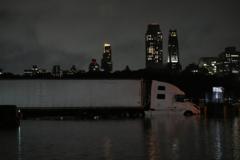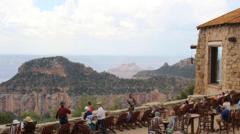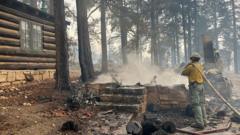As wildfires rage across Canada, particularly in Manitoba and Saskatchewan, thousands have been forced to evacuate. The fires have not only taken a toll on local communities but have also impacted air quality in nearby U.S. states, raising significant health concerns.
# Canadian Wildfires Cause Mass Evacuations and Air Quality Concerns in the U.S.

# Canadian Wildfires Cause Mass Evacuations and Air Quality Concerns in the U.S.
Wildfires in Saskatchewan and Manitoba are leading to evacuations and air quality issues extending into the upper Midwest of the United States.
Battling intense wildfires across Saskatchewan and Manitoba, emergency crews are grappling with a situation that has escalated to a state of emergency. As flames engulf large areas of land, approximately 17,000 individuals have been directed to evacuate their homes, with more expected to follow in the coming days. The fires have already devastated about 1.7 million acres, with two fatalities reported from a small town in Manitoba that suffered severe fire damage.
Reports indicate that the extraordinary amount of smoke produced from these wildfires has reached the upper Midwest of the United States, including states like Minnesota, Michigan, and Wisconsin. The Minnesota Pollution Control Agency has issued warnings to residents, anticipating that the smoke would linger at least through the start of June.
Wab Kinew, Premier of Manitoba, confirmed that the evacuation efforts have been bolstered by military support, primarily in areas where fire conditions have made evacuations hazardous. The wildfires are affecting not just rural populations, but also First Nations communities that reside in proximity to the flames.
Firefighters are diligently striving to contain the blazes, yet the season, which typically runs from March to October, appears to be off to a troubling start as fire activity intensifies, raising alarm about the potential impacts on both health and the environment. It remains crucial for residents in affected regions to stay informed and take necessary precautions as the situation develops.



















